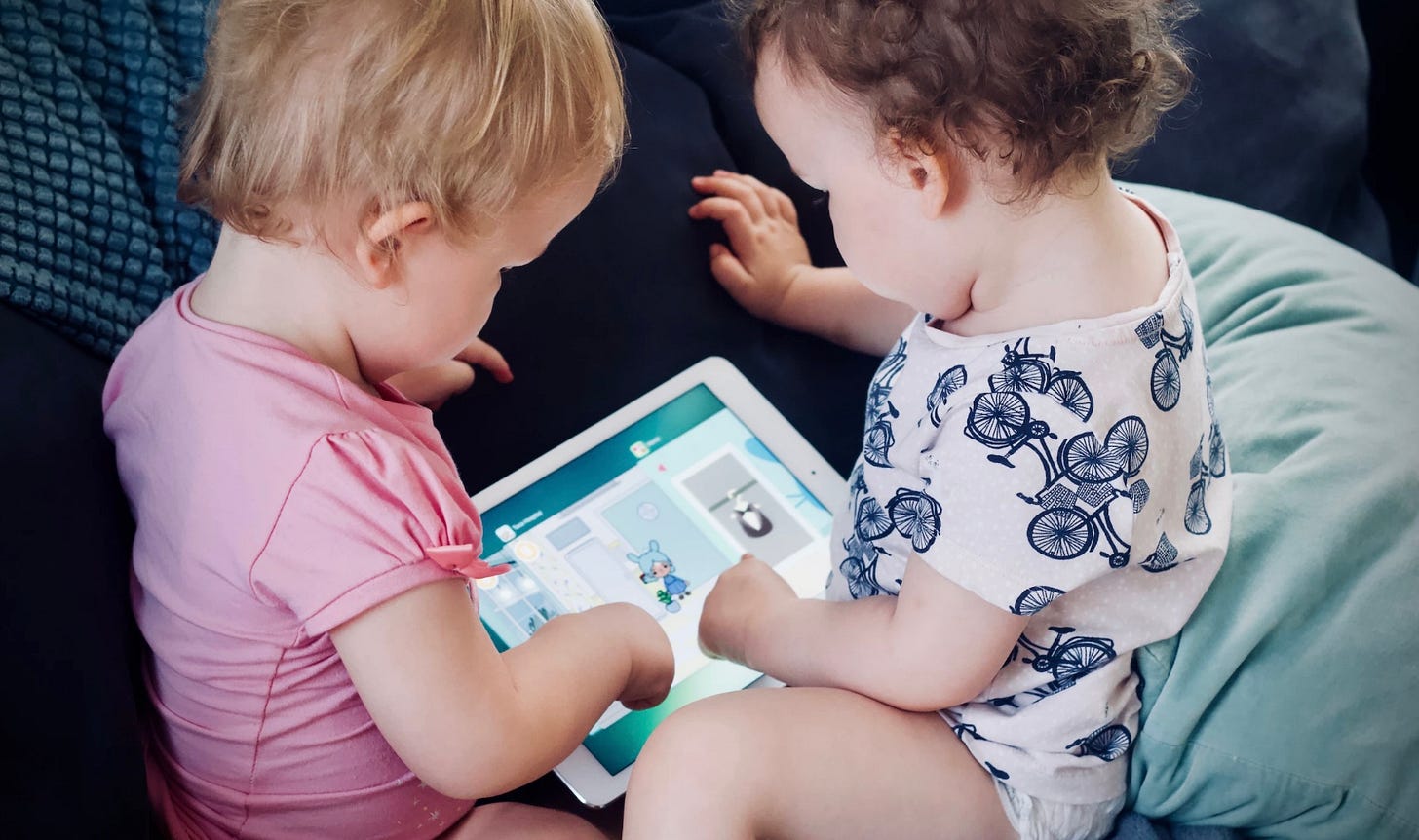There are plenty of things about my children’s education that have the power to keep me awake at night, but one thing I don’t worry about is whether they read enough. Both children love books. When we go past a bookshop they walk in automatically. The generous borrowing limits at the libraries are never quite generous enough. When I ask them to bring me the book they want to take on a journey, they invariably bring me three, minimum. It brings me daily joy to see how much they love reading.
(I don’t say this to brag. My husband and I are both big readers, and I know the odds were highly stacked in favour of our children loving books. I also know that children can switch off books at any moment—I’m nervous about writing this post in case it tempts fate and they never read again!)
I get a lot of comments when we’re out and about, about how nice it is to see children reading. Almost every time we’re on public transport and the children are reading, someone will approach me and tell me what an unusual sight it is. I’ve been talking about this with families recently, and have come to the conclusion that there is one really big, really simple reason why it’s become so remarkable to see children reading in public:

Screens.
There are many important things parents can do to introduce their children to the wonderful world of reading. But if we do all those things and then give our child the choice of printed book or interactive screen, not many children will take the book. The battle between books and screens isn’t a fair fight. The lure of the screen is just too powerful. I often choose to put my phone completely out of sight if I’m reading a book—otherwise, the mere sight of it is enough to induce me to pick it up and instantly lose 20 minutes that I could have spent reading. We need only look around in a public place to see how powerless adults are to resist the pull of the screen—how can we expect our children to fare any better?
At a restaurant recently, my two children spent most of the meal reading their books (it was a grown-up meal, and they did join in some conversation, but I felt it wasn’t reasonable to expect them to sit there for 90 minutes, polite but bored, while the adults discussed adult things). At the next table, two boys of a similar age spent the meal on an iPad while the adults sat at the other end of the table. I’m not saying either option is right or wrong, good or bad. I know screens are a saviour to parents everywhere—I myself am delighted when my children get to the appointed time for their daily 40 minutes of TV. Bliss! I was deeply grateful for screens earlier this week, when incessant squabbling finally ceased as we all watched The Snowman and the Snowdog.
I don’t blame parents. As a home educator I don’t have the pressure of “everyone in my class has one”, and my children aren’t sent home from school with homework to be completed on a laptop. My family has opted out of the school system and that makes it easier to opt out of other things too.
But introducing the option of a screen makes it very difficult to withdraw that option later. These things are insidious. The boys on the iPad in the restaurant? How will they react if their parents tell them there’s no more iPad, and they can either join in the chat or read a book? The toddler handed a phone on the bus? Who wants to be on that bus the day he’s told the phone is going away? I was told by a father recently that he’s restricted his child’s iPad use to one hour in the morning and one in the evening—that’s two hours, every day (because what child forgets their daily allowance of screen time?), that could be dedicated to something else. Not just reading, but playing in the garden, or writing a story, or chatting to her family, or staring at the ceiling numb with boredom, until—ding!—she finds something to do that doesn’t rely on a screen. Children spend about 4 hours a week playing outside. I think there’s room to tip the balance away from screens just a little bit.
(And if two hours a day doesn’t seem much, I suggest that’s because screens have a weird way of distorting time. If I told you the child spent two hours a day on music practice, or gymnastics, or talking to friends on the phone, it might have a rather different feel. Two hours is roughly 14% of her day. I think most adults have had the experience of seeing their usage figure for the day/week and thinking “where did I have a spare X hours to spend on my phone?!” Screens mess with our perception of time.)
I know technology is part of modern life. I’m not proposing that my children never use a computer. I’m using one now! But I think that if there are habits you want your child to develop—like reading, or entertaining themselves—screens pose a major obstacle. It’s very difficult to put the genie back in the bottle. Pester power is real. By far the easiest option is to leave the genie in there, as long as possible. If screens aren’t an option, your child will be forced to find something else. When you do introduce screens, be crystal clear from the outset about when and how they will be used, and stick to your guns.

Keeping screens out of the picture doesn’t guarantee your child will become a voracious reader, of course. My contention is only that if screens are on the menu, all the other dishes look considerably less appetising. And I know, all human knowledge is on the Internet. But a lot of idle entertainment is on there too, and for many children, much of the time, screens represent the ‘dessert’ portion of a meal. If we want our children to eat their greens, it’s not fair to put the glazed doughnut on the table and then throw our hands up in the air when they make the inevitable choice.
I feel obliged to add that my husband wouldn’t wholeheartedly approve this message (and that’s why I have my own Substack, ha!). He says that lots of successful entrepreneurs spent a lot of time playing video games, that Bill Gates spent his adolescence on computers, that there are lots of valuable skills to be gained from screens. I don’t doubt him. My feeling is that because screens are now so ubiquitous, and because we have to actively choose not to have them in our hands every hour of the day (and much of the night too), that there might be some good to be gained from children spending less time on devices and more time on almost anything else. If that makes me a Luddite, so be it. I have heard so many parents lament the amount of time their children spend on screens. So far, I have not once felt that this is something my children need more of.
Some useful links
How We Homeschool posts on reading:
How my children learnt to read, Part 1 and Part 2
Ten ways to teach children how to love reading, not just how to read, Part 1 and Part 2
’s Substack, Can We Read. Her recent post on reading routines is full of good ideas (as are all her other posts!).’s post, Beyond Digital Detox: How to Make a Home for Humans is a good introduction to her excellent work on breaking free of the stranglehold technology can have on our lives.An episode from the 1000 Hours Outside podcast, The Best Parenting Decision We Ever Made. Molly de Frank talks about digital detox for her family.
The Problem with Everything Being Pornified: don’t let your daughters on social media by
.Thanks for reading. If you’re not subscribed, sign up for free and never miss a post.




I loved this post! I would say that, up until a certain age, it is possible to put the genie back in the bottle. We've managed! Our older two kids are 9 and 10 -- we got them iPads during the pandemic and wound up taking them away about six months ago, after three years of constant, exhausting negotiations about screen time, as well as creeping boundaries about what kind of and how many apps we allowed on their iPads. There was grumbling, but they took it surprisingly well! (It helped that I sold their iPads on Facebook marketplace and gave them the money, which they used to buy books!). They still have a Nintendo Switch that they play for an hour or two on weekends only, but otherwise they're screen-free now and are happier and healthier and more creative for it. Just wanted to offer some optimism for parents like my husband and I who took a leap into devices for the kids and then realized they made a mistake!
I completely agree with this post, but am very conscious that I read it at the station on my phone, surrounded by other people also on their phones. Going to get my book out now 😂